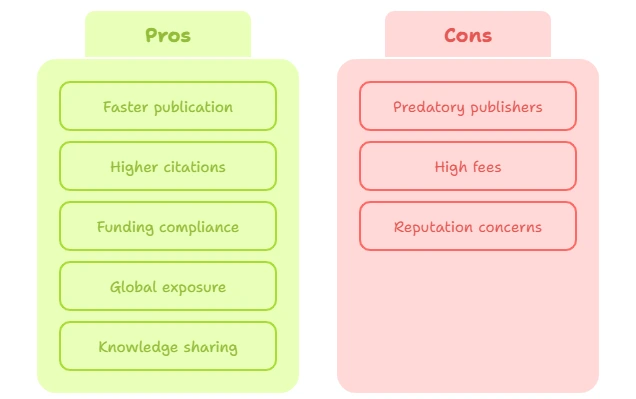In the current dynamic landscape of academic publishing, open-access journals have become a compelling alternative to conventional subscription-based. For many scholars, the question process where is whether publishing Access journals are the right choice. However this article explores both drawbacks and advantages and guides you in determining whether QA publishing suits your academic objectives.
Introduction to Open Access journals
Generally, the open access journals allow unrestricted, free access for academic research. Unlike traditional journals that limits access through subscription or pay-per-view basis, It needs scholarly work publicly available online to readers across the globe.

There are three primary forms of Open Access journal
- The researchers publish in traditional journals but also deposit a version of their work in an open-access repository.
- The research articles are accessible to all immediately upon application, specifically involving a fee known as an article processing charge.
- Conventional journals provide an Open Access option for individual articles generally requires an APC to make them freely available.
Benefits of publishing in an open-access journal
- Basically, many of it feature streamlined editorial processes and online first publishing, allowing your research to be reviewed and published more quickly than in the traditional system.
- The research specifically indicates that Open Access publications are cited more frequently than behind paywalls. Enhanced accessibility often leads to a larger leadership, which consequently increases the number of citations of your work.
- The numerous private and public research funders now require results to be published in an open-access format choosing open access journals ensures compliance with specific guidelines. For example, research supported with the European Union must be made available through Open Access platforms.
- The publishing of it is greatly enhances the discoverability of your work. Since there are no paywalls, anyone with an Internet connection can freely access and broaden the accessibility. For example, an article published in Plus One tends to receive more citations compared to subscription-based journals.
- Open Access fosters more equitable access to scientific information, specifically helping researchers and institutions in low-resource settings that may not have the means to subscribe to specific journals and academics.
Challenges
1. Predatory publishing practices
Few publishers take advantage of it due to the demand for high publication fees without offering legitimate peer review. So, publishing in such outlet’s damages credibility of the author and compromises the integrity of the warning signs, such as:
- Fake impact and misleading claims
- poorly designed web pages and unprofessional language
- absence of transparency in the review system
- improper emails aggressively seeking permission.
Safeguard your work, consult the resources such as a directory of it, or use Think Submit, and check initiatives for accessing journal legitimacy.
2. Article posting fee
The cost involved significantly concerns researchers about Open Access publishing. The article posting fee varies from one journal to another. Moreover, the expenses are difficult to manage, particularly for early career academics or research in financial support.
Main tip: Many OA journals provide full support and partial fee waivers for others from low-income regions.
3. Reputation and academic recognition
Although it has a role towards broader acceptance, few scholars still view OA originals are less prestigious compared to long-established subscription-based journals. However, the perception is gradually evolving, it’s crucial to access journal standings, inclusion, and citation metrics indexing services before submission.
Keywords:
Open Access journals, Green Open Access, Hybrid Open Access,, Drawbacks of Open Access journals, Predatory journals, Article Processing Charges (APC), Academic publishing
Read More about the Topic:
Outbound Links:
Inbound Links:
How to Structure a Winning Research Proposal
Why Publishing Your Research Matters: A Guide for Students and Early-Career Researchers

Leave a Reply